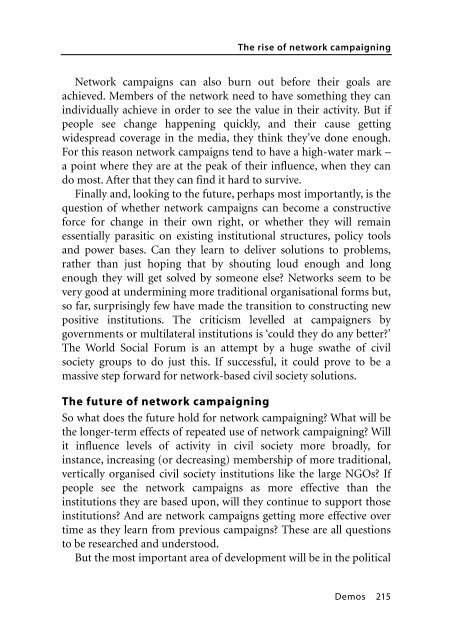Network Logic - Index of
Network Logic - Index of
Network Logic - Index of
You also want an ePaper? Increase the reach of your titles
YUMPU automatically turns print PDFs into web optimized ePapers that Google loves.
The rise <strong>of</strong> network campaigning<br />
<strong>Network</strong> campaigns can also burn out before their goals are<br />
achieved. Members <strong>of</strong> the network need to have something they can<br />
individually achieve in order to see the value in their activity. But if<br />
people see change happening quickly, and their cause getting<br />
widespread coverage in the media, they think they’ve done enough.<br />
For this reason network campaigns tend to have a high-water mark –<br />
a point where they are at the peak <strong>of</strong> their influence, when they can<br />
do most. After that they can find it hard to survive.<br />
Finally and, looking to the future, perhaps most importantly, is the<br />
question <strong>of</strong> whether network campaigns can become a constructive<br />
force for change in their own right, or whether they will remain<br />
essentially parasitic on existing institutional structures, policy tools<br />
and power bases. Can they learn to deliver solutions to problems,<br />
rather than just hoping that by shouting loud enough and long<br />
enough they will get solved by someone else? <strong>Network</strong>s seem to be<br />
very good at undermining more traditional organisational forms but,<br />
so far, surprisingly few have made the transition to constructing new<br />
positive institutions. The criticism levelled at campaigners by<br />
governments or multilateral institutions is ‘could they do any better?’<br />
The World Social Forum is an attempt by a huge swathe <strong>of</strong> civil<br />
society groups to do just this. If successful, it could prove to be a<br />
massive step forward for network-based civil society solutions.<br />
The future <strong>of</strong> network campaigning<br />
So what does the future hold for network campaigning? What will be<br />
the longer-term effects <strong>of</strong> repeated use <strong>of</strong> network campaigning? Will<br />
it influence levels <strong>of</strong> activity in civil society more broadly, for<br />
instance, increasing (or decreasing) membership <strong>of</strong> more traditional,<br />
vertically organised civil society institutions like the large NGOs? If<br />
people see the network campaigns as more effective than the<br />
institutions they are based upon, will they continue to support those<br />
institutions? And are network campaigns getting more effective over<br />
time as they learn from previous campaigns? These are all questions<br />
to be researched and understood.<br />
But the most important area <strong>of</strong> development will be in the political<br />
Demos 215
















